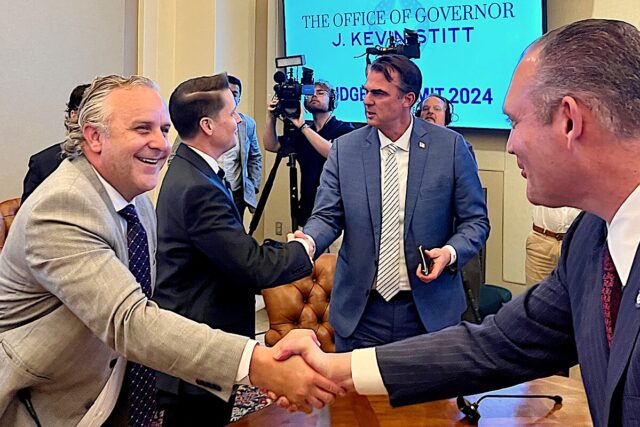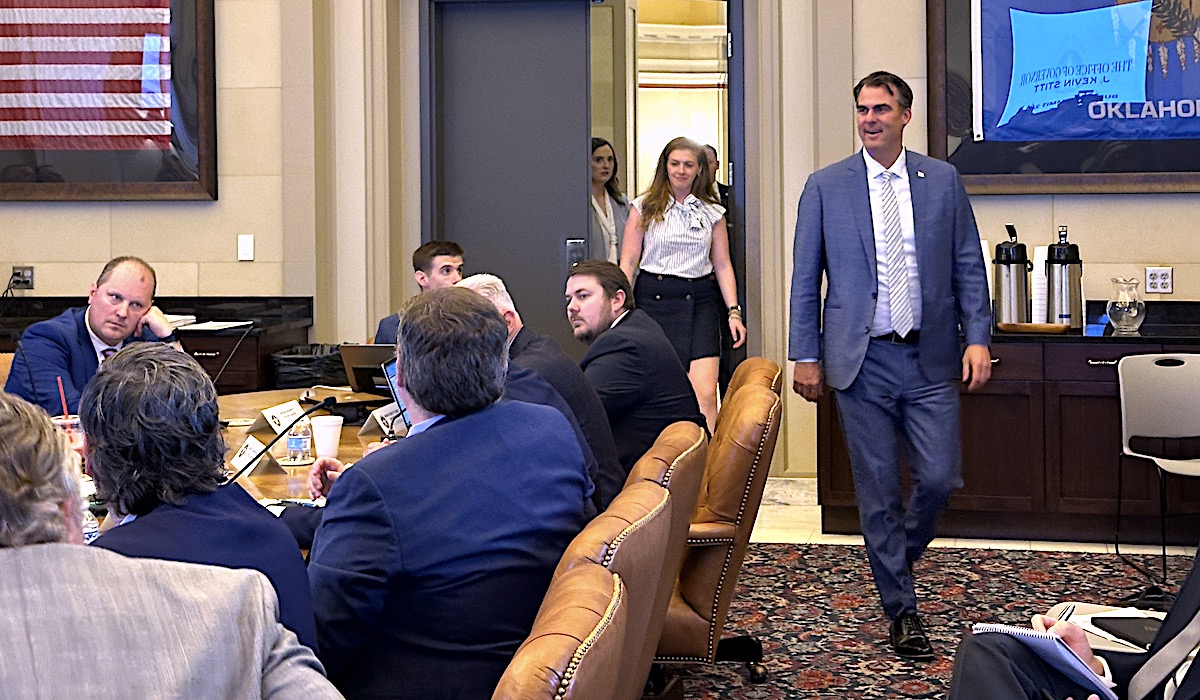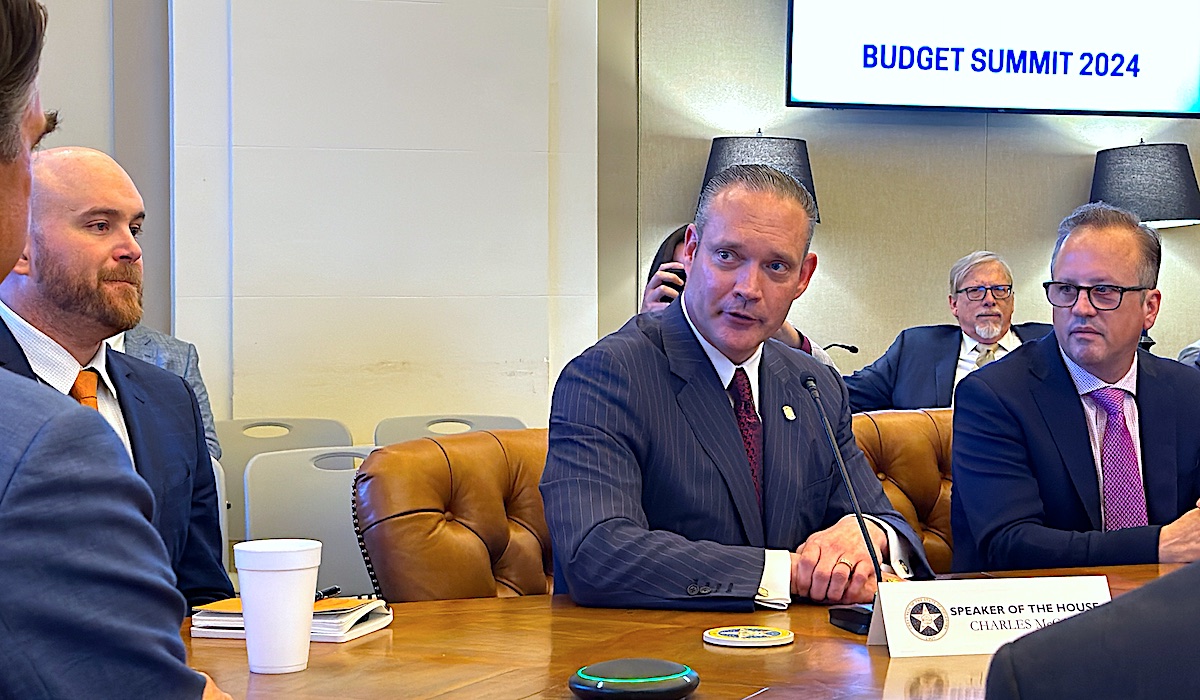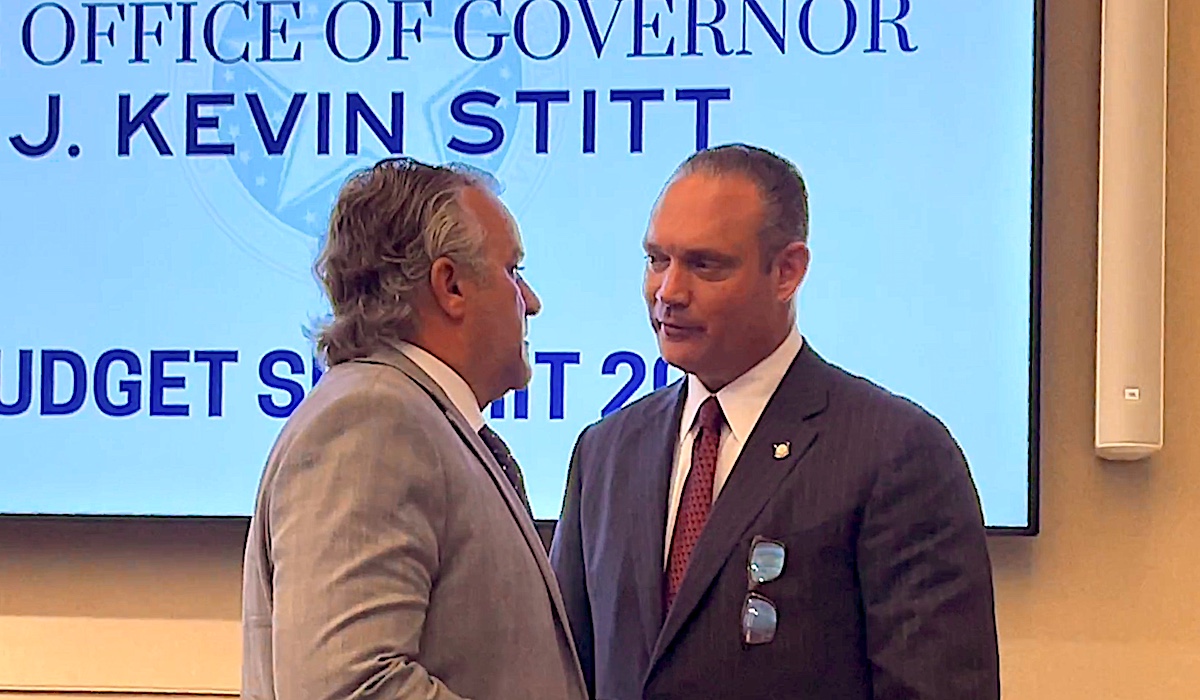
Two days after negotiations blew up for the second time in a row, leaders of the Oklahoma Legislature struck an FY 2025 state budget deal Wednesday afternoon that included four items requested by Gov. Kevin Stitt in exchange for assurances he will not veto budget bills.
The agreement — which came during the eighth public budget summit and was punctuated by handshakes across T. Boone Pickens’ former conference table on what would have been the late businessman’s 96th birthday — includes a $25 million increase in public education funding, a new grant program aimed at boosting pay in county sheriff offices, and $350 million for deferred maintenance projects at higher education institutions, state parks and other state-owned buildings.
In addition, lawmakers agreed to add $177 million to the Legacy Capital Financing Fund they created last year, which already held about $295 million appropriated in 2023. Despite Senate concerns about the innovative funding mechanism — which provides agencies up-front, interest-free money to achieve major construction projects with an agreement to repay the capital outlays to LCF over 20 years — both chambers agreed to use $371.5 million for a slate of projects at universities and law enforcement agencies. (About $100 million of unencumbered funds will remain in LCF.)
“I am glad to have finished my final budget in the Oklahoma Legislature,” House Speaker Charles McCall (R-Atoka) said during the assembled politicos’ closing remarks.
Senate President Pro Tempore Greg Treat (R-OKC) chimed in: “As am I.”
The FY 2025 state budget deal — which still must be voted on in Joint Committee on Appropriations and Budget Committee meetings and on each chamber’s floor — culminates six years of finicky financial deliberations between Treat and McCall, both of whom are prevented from seeking reelection this year owing to term limits.
Despite — or perhaps because of — that familiarity between the two men and their leadership teams, negotiations at times grew tense and inflammatory, prompting longtime State Capitol insiders to deride the 2024 regular session as “the worst” they had ever seen, a moniker many had also applied in 2023.
But during this year’s sausage-making saga, the public got to see the pig from withers to brisket.
Spurred by Treat and his caucus’ frustration with back-room deals and “last-minute” projects in recent years, the Senate set sail for more transparent seas, inviting House members along and chiding their annoyance that the proverbial water was wet.
The House responded with a speedboat of their own: an online budget portal to which only they carried the keys. McCall pledged to let the public view budget bills for at least 24 hours before moving them through JCAB, a decision the Senate initially declined to join before one-upping their counterparts with a 48-hour pledge they failed to adhere to before the year’s first JCAB meetings to appropriate $45 million for storm disaster response.
After Treat removed Sen. Roger Thompson (R-Okemah) as budget chairman April 30 for “going dark” during negotiations with his counterpart, Stitt invited House and Senate leaders to a “budget summit” in his (un-amplified) conference room May 6. Seven other public gatherings would ensue, with the first two playing out primarily as press conferences over an income tax cut the Senate opposed.
As the public negotiations dragged on, livestream viewership dwindled, and many legislators privately grumbled the discussions were only “transparent” for members of the public who had hours to waste at work and a sufficient supply of Scotch tape for their eyelids.
Last week, as a deal again neared, Treat and his Senate leadership team delivered an ultimatum asking the House to commit to overriding any budget-related veto Stitt might make. When McCall declined to sign onto that precondition, senators walked out and walked back their position — for a second time — on a handful of items.
On Monday, similar dynamics unfolded, but without McCall in the room. Treat stepped outside with Senate Floor Leader Greg McCortney (R-Ada), who returned and interrupted new Senate Appropriations and Budget Committee Chairman Chuck Hall (R-Perry) mid-sentence to reiterate the Senate’s desire for a House veto-override commitment.
Perturbed, House Appropriations and Budget Committee Chairman Kevin Wallace (R-Wellston) chastised senators Monday for failing to pass certain bills agreed to during 2023 budget negotiations, and he urged “the media to actually have a conversation about budget transparency, failed processes, and how we get our constitutional duty done.”
But when the eighth budget summit began Wednesday morning, the mood seemed lighter all around, a reflection of time Tuesday spent talking about how to “land the plane” with Stitt, who sauntered into his conference room, proposed four priorities he desired as a way to avoid vetoes, and left 20 minutes later so lawmakers could hammer out details.
After a lunch break, legislative leaders returned, shook hands and praised Stitt for the move.
“Governor, I appreciate you coming in this morning with a very reasonable, thoughtful and good proposal,” Treat said.
In his remarks, Treat argued that “friction is a good thing.”
“It’s an ugly process at times. People got to see all the warts and everything this year, but friction drives a much better product,” he said. “So as people have seen the friction between the Senate, the House and the governor, that is just the workings of government, the way it was set up. Where we have shown disrespect, that was not intended. It was intended to try to represent our independent chambers.”
McCall thanked his caucus, staff, Stitt, Treat and senators, and his “fellow Oklahomans and friends in the media here today.”
“Thank you for the time that you put in covering this, and I can’t wait to get your feedback on what you think about how this process works,” McCall said, spurring laughter from a variety of onlookers.
What did Stitt get for his pledge not to veto the budget?

In the end, tensions between the chambers dug a governance gulf wide enough for Stitt to drive four of his priorities through. Faced with the option of shoveling more manure or planting Stitt’s rosebushes, lawmakers agreed to his four requests:
- A $20 million appropriation to the Governor’s Quick Action Closing Fund (with $10 million coming from cash reserves and $10 million coming from the Unclaimed Property Fund);
- Preservation of the State-Tribal Litigation Fund created in 2021;
- Modifying a recommended judicial pay raise down to 7 percent and limiting its applicability to district court judges only; and
- Formation of a task force to review and recommend expanded parameters for a “business courts” concept that was actually authorized by statute in 2004 but has never been used.
Lawmakers in both chambers immediately had questions for Stitt about his vision for the “business courts,” which the Texas Legislature enacted last year with parameters including a $5 million dispute threshold. At least 27 other states have some version of the idea, which Stitt said he hopes will be functional by 2026 following task force recommendations.
“I think that business court deal is gonna be a huge, huge momentum for Oklahoma,” Stitt said after the day’s summit had concluded. “(This will be for) two businesses having a contract dispute — complicated shareholder rights issues — things that really a more sophisticated business judge that studies these types of cases should be (handling) — not just a family attorney. They’re more specific for large businesses.”
Stitt said he hopes the system will speed up adjudication in the state and attract more businesses to Oklahoma.
“Businesses need assurance, and then they need quicker resolutions. So yeah, there’s going to be a thought process that these will be much, much quicker cases, and obviously, we want to protect shareholder rights. We want to protect board members,” Stitt said. “We want Oklahoma to be the most business-friendly state and be the corporate headquarters capital of the world.”
To that end, Stitt also received his request for $20 million more to be deposited into the Quick Action Closing Fund, a financing tool intended to allow governors to pledge state incentives for business recruitment. While the House had supported the request for months, Senate leaders questioned why the fund’s existing balance had been dedicated to several lingering projects that have not yet come to fruition.
Stitt told lawmakers he would be comfortable with some sort of final deadline being placed on QACF encumbrances in the future.
In terms of his request for a judicial pay raise only to apply to district court judges, Stitt said he could see better compensation being necessary at the county level but not for the state’s three appellate benches.
In September, the Board on Judicial Compensation held its biennial meeting and recommended a 17 percent raise for all judges in Oklahoma. Under state law, that recommendation presents the Legislature with three options: take no action and have the full recommendation take effect; pass legislation to raise judicial pay by a different amount; pass legislation rejecting the recommended raise entirely.
Senate leaders had said they were fine with the full raise taking effect, while Wallace and other House leaders had attempted to tie the raises to a revised proposal to create a private evaluation process for state judges similar to those in some other states. The Senate voted down one version that had been included in last year’s budget deal, an action that irritated Wallace and inflamed negotiations this year.
But even after Supreme Court Chief Justice M. John Kane IV reportedly signed off on a revised version this year, Treat said the concept lacked support in the Senate.
“It just didn’t find the support it needed this session in our chamber, so that would be something that we can hold up until next year.” Treat said.
Overall, however, Treat said he was “pleasantly surprised” by Stitt’s brokerage of Wednesday’s agreement.
“If you had asked me two or three days ago, I wouldn’t have thought that was possible,” Treat said. “But I’m happy he did. It made the process come to a conclusion much quicker than it would have otherwise.”
Education items, sheriff pay included in deal

In all, McCall said the FY 2025 state budget deal includes 5.3 percent fewer appropriated dollars than last year, a reflection of the massive amount of one-time funding legislators have been dolling out for specific projects each year after federal COVID-relief appropriations filled state coffers.
Treat praised the budget deal for meeting one of the Senate’s primary objectives: retaining at least $1 billion of unencumbered cash beyond the Constitutional Reserve Fund and the Revenue Stabilization Fund, each of which requires negative economic circumstances to trigger use.
Stitt seemed pleased many agencies received budgets that were largely “flat,” a request he had emphasized since his State of the State address.
As the year’s public budget summits progressed, a number of items — such as hundreds of millions of dollars for infrastructure project investments — fell by the wayside in deference to the Senate’s savings position and the House’s hope for an income tax cut.
A pair of water-related projects were ultimately approved: $20 million to address Texas County water availability issues in the Oklahoma Panhandle, and $50 million to fund levee improvements along the Arkansas River.
Other agreements included a $18 million new grant program for county sheriff offices. While monies will not be allowed to pay salaries directly, the program is aimed at freeing up local funds to boost sheriff and deputy sheriff pay. Lawmakers agreed to increase the minimum and maximum pay scales already in statute.
In the education realm, items in the FY 2025 state budget deal include:
- An additional $25 million into the state education funding formula;
- Appropriating $1 million of state funding to the State Workforce Commission to “unlock” $4 million of American Rescue Plan Act funding;
- Appropriating $27.6 million for Career Technology schools;
- Just under $1 million to improve compensation for school psychologists, audiologists and speech pathologists;
- $4.2 million to the State Department of Education to cover costs for student assessments.
The $25 million of “formula funding” came as a compromised position based on a $100 million Senate request to provide stipends for support staff. Senators had proposed the line item after discovering that much of the historic education funding increase that passed last year and included teacher pay raises left out support staff.
But House leaders said school districts should have dedicated un-obligated funds from last year’s major increase to support their non-teacher staff members. In the end, the two sides agreed to placing $25 million into the general equalization formula, and they also agreed to a one-time FY 2024 supplemental appropriation of $16 million to cover teacher pay raises for districts that have so much local property tax revenue that they are “off” the equalization formula.
In terms of higher education, state universities and colleges are also set to receive a portion of the $350 million dedicated to deferred maintenance on state facilities. A JCAB bill will create the new Oklahoma Capital Asset Management Program and a governing board for allocation of that money over four years. (Beginning in Fiscal Year 2029, a new $50 million off-the-top apportionment from state sales tax collections will go to OCAMP for sustained funding of building projects.)
Of the $350 million, 45 percent will go toward general state building projects, 10 percent will go to state park projects managed by the Tourism and Recreation Department, and 45 percent will go to higher education institutions. The higher education projects will be divided among four-year research universities, Regional University System of Oklahoma four-year schools and two-year community colleges.
In FY 2025, however, the University of Oklahoma and Oklahoma State University will not receive deferred maintenance funds because they each received LCF funding for pairs of capital projects.
Capital projects galore, but what about special session?

Both of those research institutions also received the largest chunks of other capital investments. Using the Legacy Capital Financing Fund to require ultimate repayment of the monies while avoiding interest rates on traditional bonded debt, the Legislature is sending the University Hospitals Authority and Trust $160 million to be split evenly for OU projects: a new engineering building and a new “wet” laboratory building. An additional $80 million will go to the OSU Medical Authority for a “science building” and $30 million will go to OSU for hospital improvements.
Despite lawmakers’ push for transparency on such items this year, details on the OU and OSU projects remain scant.
Also receiving LCF financing were the Oklahoma State Bureau of Investigation and the Department of Public Safety. OSBI’s $27.5 million appropriation will go toward a new headquarters building that will house most OKC-metro employees. Separate funding is also being provided for OSBI to remediate a significant mold problem at its current building.
One-time FY 2025 capital project appropriations (non-LCF):
• $16 million to implode and replace the Department of Environmental Quality’s decommissioned parking garage;
• $10 million to the Department of Commerce for a STEM lab at Rogers State University;
• $6 million to the Department of Agriculture for OSU’s Food and Agricultural Products Center;
• $4 million to DPS to fund a building for Ardmore’s Highway Patrol Troop F;
• $2.85 million to the Oklahoma Educational Television Authority for 11 transmitters; and
• $20 million to the OSU Veterinary Medicine Authority for an animal diagnostic laboratory.
DPS, meanwhile, will receive and pay back over 20 years $74 million for phase 2 of its new training center in Lincoln County, a project approved initially last year by lawmakers for about $60 million. But this year, the massive project drew opposition from McCortney, who cited “significant questions” about size, scope and impact on the Council of Law Enforcement Education and Training in his district. McCortney suggested clawing back funds from phase 1, a statement that caused DPS Commissioner Tim Tipton to break an unwritten rule for agency heads and strongly criticize the Senate’s designated next leader.
On Wednesday, Treat cited Tipton’s words about McCortney as “the one sour note” he had about the FY 2025 budget negotiation process.
“That is unacceptable, but — much credit to Sen. McCortney and the entire team — we put the merits of the project above petty politics that were being played out here by a state agency director,” Treat said. “I think what he did and what he said about the next pro tem of the Senate is very problematic, and I think he owes Sen. McCortney an apology for the way he engaged in the political process that he should have stayed outside of. However, we got the project funded. We will hold them accountable to make sure that those dollars are spent properly.”
McCortney, meanwhile, looked to future negotiations with House Speaker-elect Kyle Hilbert (R-Bristow).
“We’ve already had conversations about how to build on the transparency project that the pro tem started,” McCortney said. “One of the crowing achievements of [Treat’s] time as pro tem is dragging this process out from from darkness into light, and I look forward to getting to take his work and build on it next year.”
But despite Wednesday’s kind words and adulation among the three proverbial legs of the state budget stool, it’s possible that Treat and McCall could end up doing boisterous battle again — as soon as next month.
Since early in the this year’s regular session — which must conclude by May 31 — rumors have swirled that Stitt would call the Legislature into another special session for the purpose of pursuing an income tax cut, something he did to no avail last fall.
Asked after Wednesday’s summit concluded, Stitt held his constitutionally dealt cards close to his vest.
“I’m not even considering right now what’s going to happen in June. I’m going to celebrate the fact that we landed the plane, we got this budget done right now,” Stitt said. “Oklahomans know exactly where I stand. I think the Senate was clear where they stood on a tax cut this session. We got the grocery tax (cut) done, which is a great thing. Obviously, I was pushing for an income tax cut or path to zero because we’ve got to beat Arkansas, and Arkansas is now lower than us, and Colorado is lower than us, and Texas is lower than us.
“I want to be the most business-friendly state. And so when we have excess revenue, we have to just kind of think about these tax cuts and not keep growing government. So Oklahomans know exactly where I’m at. If I could do the tax cut myself, without the House (or) the Senate, it would already be done. I’m not saying we won’t call a special session, but now, we need to just be happy about this. Let’s get this budget done.”
(Clarification: This article was updated at 9:35 p.m. Wednesday, May 22, to clarify reference to Workforce Commission funding. It was updated again to clarify that a new DEQ parking garage is planned as part of the agency’s $16 million one-time appropriation.)





















